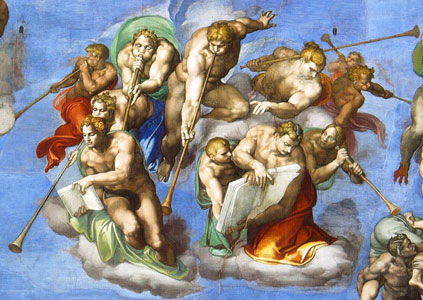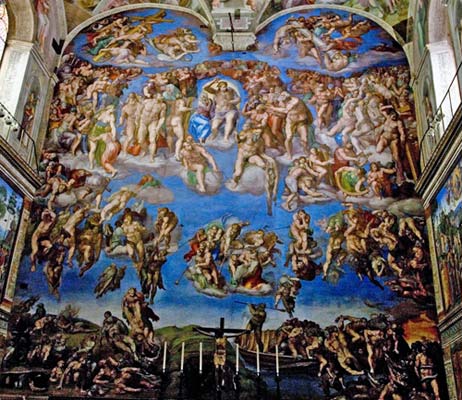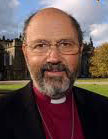December 2011 - Vol. 55
The picture of Jesus as the coming judge is the central feature of another absolutely vital and non-negotiable Christian belief: that there will indeed be a judgment in which the creator God will set the world right once and for all. The word ‘judgment’ has carried negative overtones for a good many people in our liberal and post-liberal world. We need to remind ourselves that throughout the Bible, not least in the Psalms, God’s coming judgment is a good thing, something to be celebrated, longed for, yearned over. It causes people to shout for joy, and indeed the trees of the field to clap their hands.1 In a world of systematic injustice, bullying, violence, arrogance and oppression, the thought that there might be a coming day when the wicked are firmly put in their place and the poor and weak are given their due is the best news there can be. Faced with a world in rebellion, a world full of exploitation and wickedness, a good God must be a God of judgment. The liberal optimism of the nineteenth century had a long run for its money, outlasting some of the more obvious counter-arguments provided by the huge systemic evil of the twentieth century. But more recent theology has returned to the theme of judgment, recognizing that the biblical analysis of evil corresponds more closely to reality.2 The Old Testament hope for the creator God to bring judgment and justice to the world, to set the world right, became focused in the later biblical period on Israel’s longing to see God overturn the oppressive regimes of the pagan world. It would be like a great, cosmic law-court scene. Israel (or at least the righteous within Israel) would play the part of the helpless defendant. The Gentiles (or at least the particularly wicked ones) would play the part of the arrogant bullies who would at last meet their match, and get the justice (the ‘judgment’) they deserved. The most famous scenario which expresses all this is Daniel 7. There, the Gentile nations are depicted as huge, powerful monsters, while Israel, or the righteous within Israel, are depicted as an apparently defenceless human being, ‘one like a son of man’. The scene is a great law-court setting, whose climax comes when the judge, the Ancient of Days, takes his seat and finds in favour of the son of man against the monsters, of Israel against the pagan empires. The son of man is then given authority and dominion over all the nations, in a deliberate echo of Adam being given authority over the animals in Genesis 1 and 2. What happens when this is transposed to the New Testament? Answer: we find Jesus himself taking on the role of the ‘son of man’, suffering then vindicated. Then, as in Daniel, he receives from the Supreme Judge the task of bringing this judgment to bear on the world. This accords with numerous biblical and post-biblical passages in which Israel’s Messiah, the one who represents Israel in person, is given the task of judgment. In Isaiah 11, the Messiah’s judgment creates a world where the wolf and the lamb lie down side by side. In Psalm 2, the Gentiles tremble when the Messiah is enthroned. Again and again the Messiah is stated to be God’s agent to bring the whole world, not just Israel, back into the state of justice and truth for which God longs as much as we do. So the early Christians, who had concluded from Easter that Jesus was indeed the Messiah, naturally identified him as the one through whom God would put the world to rights. They didn’t simply deduce this from their belief in his future coming or appearing. Actually, it may have been the other way round: their belief in Jesus’ messiahship may have been a decisive factor in the emergence of the belief in his final coming as judge. Certainly by the time of Paul this belief is well established. The summary of what Paul said on the Areopagus in Athens concludes with the statement that God has fixed a day on which he will judge the world by a man whom he has appointed, giving assurance of the fact by raising him from the dead.3 Paul can refer almost casually (in Romans 2.16) to the fact that, according to the gospel he preaches, God will judge the secrets of all hearts through Jesus the Messiah. Although people often suppose that, because Paul taught justification by faith, not works, there can be no room for a future judgment ‘according to works’, this only goes to show how much some have radically misunderstood him. The future judgment according to deeds, a judgment exercised by Jesus at his ‘judgment seat’, is clearly taught in, for instance, Romans 14.9–10, 2 Corinthians 5.10 and elsewhere. Equally important, these are not isolated places where Paul is quoting a tradition that doesn’t fully fit with his developed theology. They are fully and tightly integrated into his thinking and preaching. For him, as much as for anyone else in the early church, the final judgment, exercised by Jesus the Messiah, was a vital element, without which all sorts of other things simply wouldn’t stand up. In particular (though there isn’t space to develop this here) this picture of future judgment according to works is actually the basis of Paul’s theology of justification by faith.4 The point of justification by faith isn’t that God suddenly ceases to care about good behaviour or morality. Justification by faith cannot be collapsed, as so many in the last two centuries have effectively tried to do, either into a generalized liberal view of a laissez-faire morality or into the romantic view that what we do outwardly doesn’t matter at all since the only thing that matters is what we’re like inwardly. (Those who over-anxiously defend a doctrine from which all mention of ‘works’ has been rigorously excluded should consider with whom they are colluding at this point!) No: justification by faith is what happens in the present time, anticipating the verdict of the future day when God judges the world. It is God’s advance declaration that, when someone believes the gospel, that person is already a member of his family no matter who their parents were, that their sins are forgiven because of Jesus’ death, and that on the future day, as Paul says, ‘there is now no condemnation’ (Romans 8.1). Clearly there are further questions to be asked about how the verdict issued in the present can so confidently be supposed to anticipate correctly the verdict issued in the future on the basis of the entire life led. Paul addresses those questions in several ways at several points, particularly in his expositions of the work of the Holy Spirit. But for Paul (and this is the only point I am making in the present context) there was no clash between present justification by faith and future judgment according to works. The two need, and depend upon, one another. To go any further would demand a fairly thorough exposition of Romans and Galatians, for which there is obviously no space here. #5 Once again, the Pauline picture is filled out by other references in the New Testament. This is no flash in the pan or Pauline idiosyncrasy; it is common early Christian belief. #6 It is the central point in that long paragraph in John 5 which caused so many headaches to those earlier scholars who tried to make John’s gospel teach simply a present eternal life, rather than also the future one: The father doesn’t judge anyone; he has handed over all judgment to the son, so that everyone should honour the son just as they honour the father. Anyone who doesn’t honour the son doesn’t honour the father who sent him. I’m telling you the solemn truth: anyone who hears my word, and believes in the one who sent me, has eternal life. Such a person won’t come into judgment; they will have passed out of death into life. I’m telling you the solemn truth: the time is coming – in fact, it’s here already! – when the dead will hear the voice of God’s son, and those who hear it will live. You see, just as the father has life in himself, in the same way he has given the son the privilege of having life in himself. He has even given him authority to pass judgment, because he is the son of man. Don’t be surprised at this. The time is coming, you see, when everyone in the tombs will hear his voice. They will come out – those who have done good, to the resurrection of life, and those who have done evil, to the resurrection of judgment. I can’t do anything on my own authority. I judge on the basis of what I hear. And my judgment is just, because I’m not trying to carry out my own wishes, but the wishes of the one who sent me.7The main point to notice, once more, is that all the future judgment is highlighted basically as good news, not bad. Why so? It is good news, first, because the one through whom God’s justice will finally sweep the world is not a hard-hearted, arrogant or vengeful tyrant, but the Man of Sorrows, who was acquainted with grief; the Jesus who loved sinners and died for them; the Messiah who took the world’s judgment upon himself on the cross. Of course, this also means that he is quite uniquely placed to judge the systems and rulers that have carved up the world between them, and the New Testament points this out here and there.8 In particular, as we have already seen and as some medieval theologians and artists highlighted, Jesus comes as judge much as Moses descended the mountain into the camp where idolatry and revelry was in full swing. The Sistine Chapel itself reminds us of the day when careless and casual living, as well as downright wickedness, will be brought to book.9  Trumpets and opening of books - detail from The Last Judgment, painted by Michelangelo Within the New Testament, and within subsequent Christian theology, this judgment is anticipated under certain circumstances. I have already spoken of justification by faith. The same is true, in 1 Corinthians, for the eucharist: eating and drinking the body and blood of Jesus means confronting here and now the one who is the judge as well as the saviour of all.10 And the same is true, of course, of the work of the Spirit, as we see once more in John 16. When the Spirit comes, declares Jesus, he will convict the world of sin, of righteousness and judgment.11 The final judgment, in other words, will be anticipated in the present world through the Spirit-led work and witness of Jesus’ followers. Second
coming
and judgment
First, the appearing or coming of Jesus offers the complete answer to the literalist fundamentalists on the one hand and to the proponents of that ‘cosmic Christ’ idea I outlined in Chapter 5. Jesus remains other than the church, other than the world, even while being present to both by the Spirit. He confronts the world in the present, and will do so personally and visibly in the future. He is the one to whom every knee shall bow (Philippians 2.10–11), as well as the one who took the form of a servant and was obedient to the death of the cross (Philippians 2.6–8). Indeed, as Paul stresses, he is the first because he did the second. In his appearing we find neither a dualist rejection of the present world, nor simply his arrival like a spaceman into the present world, but the transformation of the present world, and ourselves within it, so that it will at last be put to rights, and we with it. Death and decay will themselves be overcome, and God will be all in all. This means, second, that a proper shape and balance are given to the Christian worldview. Like the Jewish worldview, but radically opposed to the Stoic, the Platonic, the Hindu and the Buddhist worldviews, Christians tell a story with a beginning, a middle and an end. Not to have closure at the end of the story – to be left with a potentially endless cycle, round and round with either the same things happening again and again, or simply perhaps the long outworking of karma – would be the very antithesis of the story told by the apostles, and by the long line of their Jewish predecessors. And, precisely because Jesus is not collapsed into the church, or indeed the world, we can renounce on the one hand the triumphalism that conveniently makes his sovereign lordship an excuse for its own, and on the other hand the despair that comes when we see such hopes dashed, as they always will be, in the follies and failings of even the best and greatest Christian organizations, structures, leaders and followers. Because we live between ascension and appearing, joined to Jesus Christ by the Spirit but still awaiting his final coming and presence, we can be both properly humble and properly confident. ‘We proclaim not ourselves, but Jesus Christ as Lord, and ourselves as your servants through Jesus.’12 Third, following directly from this, the task of the church between ascension and parousia is therefore set free both from the self-driven energy that imagines it has to build God’s kingdom all by itself, and the despair that supposes it can’t do anything until Jesus comes again. We do not ‘build the kingdom’ all by ourselves, but we do build for the kingdom. All that we do in faith, hope and love in the present, in obedience to our ascended Lord and in the power of his Spirit, will be enhanced and transformed at his appearing.13 This too brings a note of judgment, of course, as Paul makes clear in 1 Corinthians 3.10–17. The ‘day’ will disclose what sort of work each builder has done. In particular, the present rule of the ascended Jesus Christ and the assurance of his final appearing in judgment should give us – which goodness knows we need today – some clarity and realism in our political discourse. Far too often Christians slide into a vaguely spiritualized version of one or other major political system or party. What would happen if we were to take seriously our stated belief that Jesus Christ is already the Lord of the world, and that at his name, one day, every knee would bow? You might suppose that this would inject merely a note of pietism, and make us then avoid the real issues – or, indeed, to attempt a theocratic take-over bid. But to think in either of those ways would only show how deeply we have been conditioned by the Enlightenment split between religion and politics. What happens if we reintegrate them? As with specifically Christian work, so with political work done in Jesus’ name: confessing Jesus as the ascended and coming Lord frees up the political task from the necessity to pretend that this or that programme or leader has the key to Utopia (if only we would elect him or her). Equally, it frees up our corporate life from the despair that comes when we realize that, once again, our political systems let us down. The ascension and appearing of Jesus constitute a radical challenge to the entire thought-structure of the Enlightenment (and of course several other movements). And, since our present western politics is very much the creation of the Enlightenment, we should think seriously about the ways in which, as thinking Christians, we can and should bring that challenge to bear. I know this is giving a huge hostage to fortune, raising questions to which I certainly don’t know the answer, but I do know that unless I point all this out one might easily get the impression that these ancient doctrines are of theoretical or abstract interest only. They aren’t. People who believe that Jesus is already Lord, and that he will appear again as judge of the world are called and equipped (to put it mildly) to think and act quite differently in the world from those who don’t. I shall pursue these questions a bit further in the final Part of the book. In particular, of course, the hope of Jesus’ coming as judge, to put right all that is wrong in the world and to give new life to the dead, is the context for one of our central themes, to which we can at last turn. If all this is so, what can we say about the future that awaits every one of us, every baptized believer in Jesus Christ? What precisely do we mean, for ourselves, when we speak of the future resurrection? [This
article is excerpted
from the book, Surprised by Hope, Chapter
11, by (c) Tom Wright,
and first published in 2007 by the Society
for Promoting Christian Knowledge (SPCK),
London, Great Britain. Used
with permission.]
Notes 1
Ps. 98.8; the whole Psalm is relevant, as are
several others in that section
of the Psalter.
|
. | |||
|
publishing address: Park Royal Business Centre, 9-17 Park Royal Road, Suite 108, London NW10 7LQ, United Kingdom email: living.bulwark@yahoo.com |
. |

